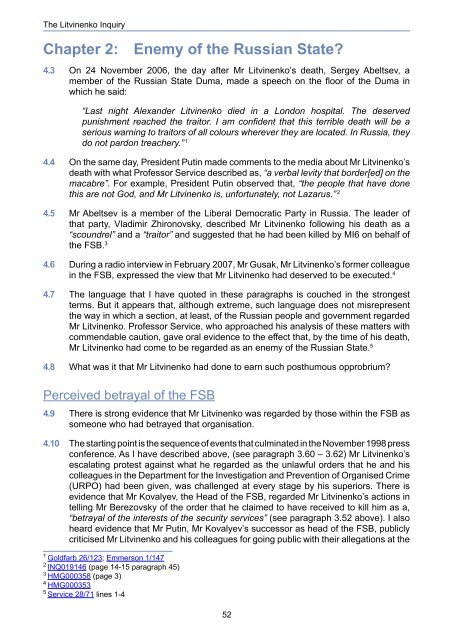The Litvinenko Inquiry
JIEp7Zyr
JIEp7Zyr
You also want an ePaper? Increase the reach of your titles
YUMPU automatically turns print PDFs into web optimized ePapers that Google loves.
<strong>The</strong> <strong>Litvinenko</strong> <strong>Inquiry</strong><br />
Chapter 2: Enemy of the Russian State?<br />
4.3 On 24 November 2006, the day after Mr <strong>Litvinenko</strong>’s death, Sergey Abeltsev, a<br />
member of the Russian State Duma, made a speech on the floor of the Duma in<br />
which he said:<br />
“Last night Alexander <strong>Litvinenko</strong> died in a London hospital. <strong>The</strong> deserved<br />
punishment reached the traitor. I am confident that this terrible death will be a<br />
serious warning to traitors of all colours wherever they are located. In Russia, they<br />
do not pardon treachery.” 1<br />
4.4 On the same day, President Putin made comments to the media about Mr <strong>Litvinenko</strong>’s<br />
death with what Professor Service described as, “a verbal levity that border[ed] on the<br />
macabre”. For example, President Putin observed that, “the people that have done<br />
this are not God, and Mr <strong>Litvinenko</strong> is, unfortunately, not Lazarus.” 2<br />
4.5 Mr Abeltsev is a member of the Liberal Democratic Party in Russia. <strong>The</strong> leader of<br />
that party, Vladimir Zhironovsky, described Mr <strong>Litvinenko</strong> following his death as a<br />
“scoundrel” and a “traitor” and suggested that he had been killed by MI6 on behalf of<br />
the FSB. 3<br />
4.6 During a radio interview in February 2007, Mr Gusak, Mr <strong>Litvinenko</strong>’s former colleague<br />
in the FSB, expressed the view that Mr <strong>Litvinenko</strong> had deserved to be executed. 4<br />
4.7 <strong>The</strong> language that I have quoted in these paragraphs is couched in the strongest<br />
terms. But it appears that, although extreme, such language does not misrepresent<br />
the way in which a section, at least, of the Russian people and government regarded<br />
Mr <strong>Litvinenko</strong>. Professor Service, who approached his analysis of these matters with<br />
commendable caution, gave oral evidence to the effect that, by the time of his death,<br />
Mr <strong>Litvinenko</strong> had come to be regarded as an enemy of the Russian State. 5<br />
4.8 What was it that Mr <strong>Litvinenko</strong> had done to earn such posthumous opprobrium?<br />
Perceived betrayal of the FSB<br />
4.9 <strong>The</strong>re is strong evidence that Mr <strong>Litvinenko</strong> was regarded by those within the FSB as<br />
someone who had betrayed that organisation.<br />
4.10 <strong>The</strong> starting point is the sequence of events that culminated in the November 1998 press<br />
conference. As I have described above, (see paragraph 3.60 – 3.62) Mr <strong>Litvinenko</strong>’s<br />
escalating protest against what he regarded as the unlawful orders that he and his<br />
colleagues in the Department for the Investigation and Prevention of Organised Crime<br />
(URPO) had been given, was challenged at every stage by his superiors. <strong>The</strong>re is<br />
evidence that Mr Kovalyev, the Head of the FSB, regarded Mr <strong>Litvinenko</strong>’s actions in<br />
telling Mr Berezovsky of the order that he claimed to have received to kill him as a,<br />
“betrayal of the interests of the security services” (see paragraph 3.52 above). I also<br />
heard evidence that Mr Putin, Mr Kovalyev’s successor as head of the FSB, publicly<br />
criticised Mr <strong>Litvinenko</strong> and his colleagues for going public with their allegations at the<br />
1<br />
Goldfarb 26/123; Emmerson 1/147<br />
2<br />
INQ019146 (page 14-15 paragraph 45)<br />
3<br />
HMG000358 (page 3)<br />
4<br />
HMG000353<br />
5<br />
Service 28/71 lines 1-4<br />
52


